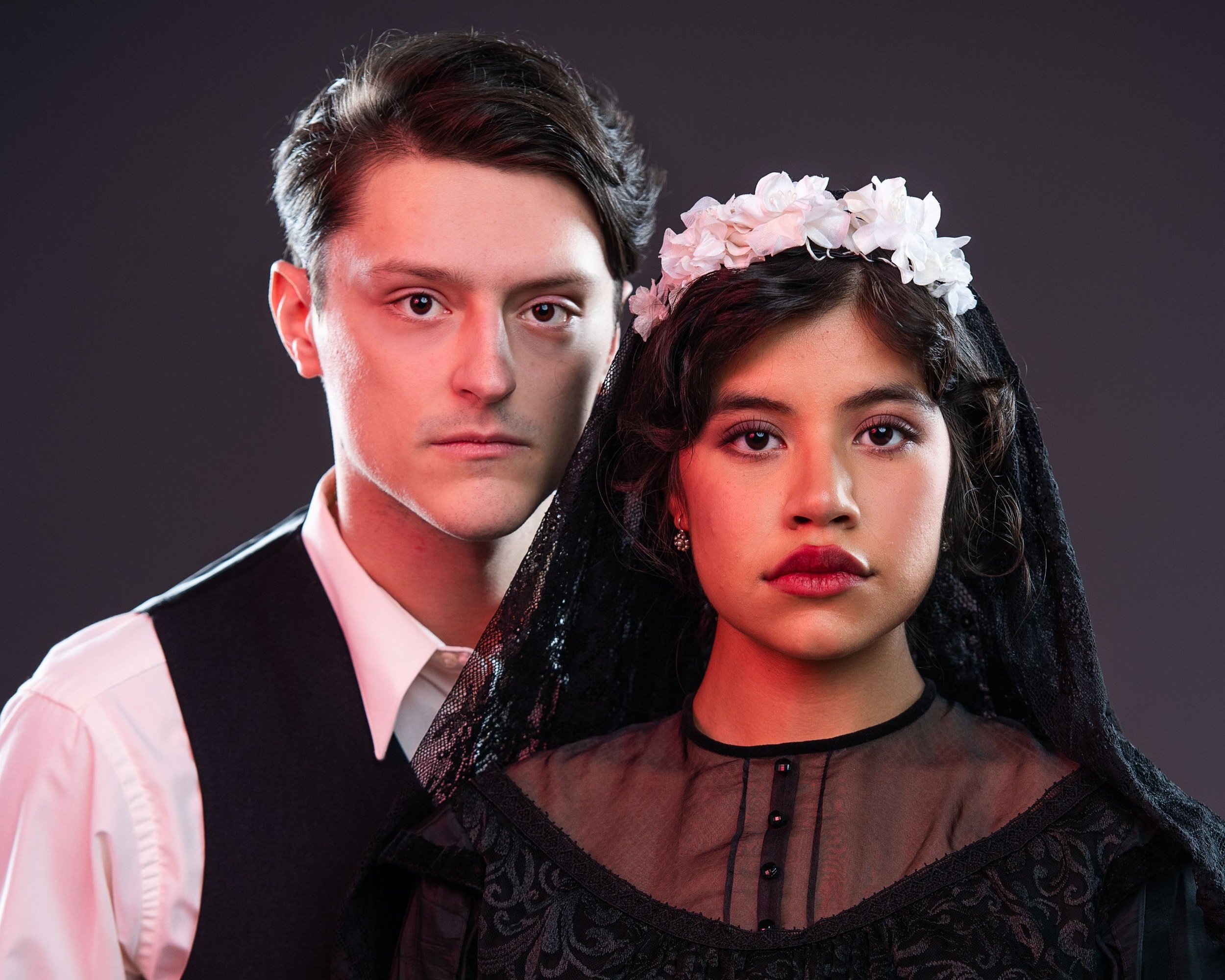Theatre review: Studio 58 breathes fresh life into Blood Wedding, with Andalusian flair
Flamenco rhythms meet striking design and strong performances in Carmen Aguirre-helmed production
Caylen Creative and Michelle Avila Navarro in Blood Wedding. Photo by Emily Cooper
Blood Wedding is at Studio 58 to December 3
A GUITAR, A PALMA, a stomp —these are the opening notes of Studio 58's rendition of Blood Wedding. Simultaneously delicate and biting with all the intensity that the material calls for, director Carmen Aguirre’s production taps into Andalusian folk traditions, embracing raw emotion and a sleek, experimental design. The result is a vivid tableau breathing fresh life into Federico García Lorca's enduring classic.
Delving into life in rural Spain, themes of passion, and the oppression of entrenched traditions, the three-act tragedy unravels the Girl's conflict—poised for marriage but entangled in lingering emotions for the married Leonardo Félix (the only named character in the play). While the oblivious Boy awaits his big day, his Mother conceals the Girl's past romance and her own profound grief, rooted in the tragic deaths of her husband and son at the hands of the Félix family. On the wedding day, the Girl and Leonardo flee, triggering a pursuit. In the name of honour, events take a surreal and tragic turn.
Aguirre embraces the original’s backdrop, albeit with a small conceit: she shifts it into the confines of an Andalusian bar, the story told by a roving troupe of performers.
Later taking on the role of Leonardo, Terrence Zhou establishes the bohemian setting, strumming an acoustic guitar while actors weave through the audience, exchanging loud greetings with each other before settling into a half-moon-shape on stage. For most of the play, the 19 performers act as perpetual witnesses and chorus to the unfolding action. As tension escalates, the ensemble builds on the atmosphere with pounding rhythms and vocal harmonies.
Bringing the lively flamenco feel of the production to life is Oscar Nieto’s choreography. Artfully choreographed segments unfold not just during the wedding party scene, where guests dance and share sentiments with the ill-fated couple, but also in scene transitions and interludes. Pay attention to the entrances of the female characters—they're something special.
In Langston Hughes’s translation, adapted by Melia Bensussen, Lorca's script retains emotional intensity and an earthy depth that's rich in symbolism. There's also a subtle yet distinct undercurrent of dark humour, and the performances tap into these nuanced elements.
Sewit Eden Haile, who kicks off the show as the groom’s Mother with resentment and concern edging anger and dread, is pure brilliance. Her doubts about her son's impending marriage and fatalistic take on life dance on the line of funny melodrama and heart-wrenching impact. The Girl (Michelle Avila Navarro) emanates restrained strength and concealed desire, rapidly unwinding into a convincingly matched passion alongside Zhou's unbridled Leonardo. As the Boy, Caylen Creative has an endearing energy.
In the second scene, Leonardo's Wife (Emma Soothill) and Mother-in-Law (Samantha Kerr) sing a cryptic, haunting lullabye that hints at his adultery, and the melancholy resonance of the lyrics pervades both performances, particularly Soothill’s.
In stark contrast to the somberness is the Girl's amiable Father, played by Samuel Walmsley-Byrne. Lynny Bonin’s Servant and Serena Hatch’s Child similarly bring levity with their nosily playful antics. I’d also be remiss not to acknowledge the contributions of Marielle Ortinez as a cantaora, whose rendition of a flamenco song during the second act echoes with beautiful groundedness.
The cast captures a compelling sense of symbiosis, complemented by the design team's efforts. An elegant simplicity, coupled with a willingness to let the performances take centre stage, is enhanced by minimal elements—antique wooden chairs, and a sizeable table and wine glasses for the nuptial ceremony. When things get surreal, fog cloaks the stage, and David Roberts’s projection design paints a desolate black-and-white landscape that almost resembles a dark children's picture book, poignantly underscoring the violent, cyclic nature of history intertwined with myth.
Costume designer Amy McDougall dresses the characters monochromatically, adding visual allure to the black dresses worn by the Girl and the Mother during the wedding, as well as pointed splashes of blue and red.
The lighting, designed by Itai Erdal, is a highlight—literally. Following the narrative’s descent into dark tragedy, the stage is illuminated by blinding white light, a moment that, though initially striking, gradually establishes an otherworldly, spiritual, and almost serene atmosphere amid the story’s losses.
With a powerful start and equally strong finish, Studio 58's Blood Wedding sustains its synergy and inventive flair. It's a night of classical theatre that pulses with syncopated rhythm.













